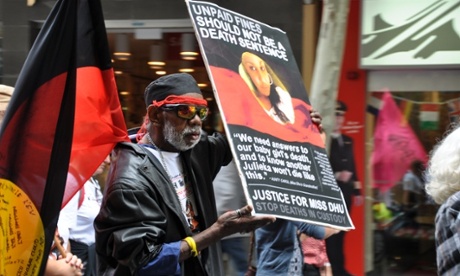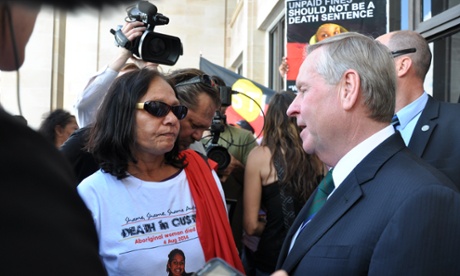The Barnett government has introduced legislation it says will reduce the number of Indigenous people jailed for failing to pay fines.
Western Australia’s practice of jailing people who default on court fines has received international criticism since the death in custody of the Yamatji woman Ms Dhu, who had been locked up in Port Hedland police station for $3,622 in unpaid fines.
Dhu was arrested on the Saturday of a long weekend and would have spent four days in custody to “cut out” her fines at a rate of $250 a day. She died two days later, on 4 August 2014. The findings of a coronial inquest into her death are yet to be handed down.
The attorney general, Michael Mischin, said proposed changes to the sentencing legislation amendment bill 2016 would provide magistrates with alternatives to requiring the payment of a fine, such as allowing the debt to be paid off in unpaid work hours or through the completion of a drug and alcohol rehabilitation program.
The change would mean magistrates impose a fine but immediately offer an alternative in lieu of payment.
It would also give magistrates the option of suspending the fine for up to two years. If no other offences were committed in that time the fine would be discharged.
However, Ruth Barson, who has worked with Dhu’s family in her role as the director of legal advocacy with the Human Rights Law Centre, said the proposed changes were a half-measure.
Dhu’s family has campaigned since her death for an end to jailing people for fines and for the introduction of a custody notification system.
“If the Barnett government was committed to reducing the number of vulnerable and Aboriginal and Torres Strait Islander people being locked up for fine default then they just need to change the fines legislation itself to make it far more flexible,” Barson told Guardian Australia.
She said the legislation did not account for resource shortfalls in rural and regional WA, which could limit sentencing options, and said WA should emulate the “excellent blueprint” of New South Wales, which stopped using jail time to “cut out” fines in 1996.
It is the second major change announced since the premier, Colin Barnett, publically promised Dhu’s mother, Della Roe, that he would address the issues that led to her death.
The first, extending the Aboriginal visitors scheme to a 24-hour hotline available to Indigenous people imprisoned in police cells, was also a “B-grade” system, Barson said.
In that case, Dhu’s family and Indigenous advocates had been calling for WA to introduce a formal custody notification system (CNS), again following a NSW model, which would impose a mandatory requirement on police to contact the Aboriginal Legal Service any time they held an Indigenous person in custody. There were no Indigenous deaths in NSW police cells since the introduction of the CNS in 2000 to the death of Wiradjuri woman Rebecca Maher on 19 July, in circumstances where the CNS was reportedly not used.
“Each time we have seen an announcement like this it has been substandard,” Barson said.
“If the government is really genuinely wanting to address the injustice that’s going on in WA then one of the first things it needs to be doing is consulting with Aboriginal organisations on the best way to do that.”
Mischin told state parliament that the over-representation of Indigenous people in the justice system was most marked in lower or mid-range offences that were heard before the magistrates court, where 88% of sentences result in a fine.
“The concern for government is that, in many cases, this leads to a cycle of offending and convictions; fines; inability or unwillingness to pay the fines; entry into the fines enforcement system and, potentially, imprisonment,” he said.
The number of people jailed for fine default in WA increased from 442 in 2007-2008 to 1127 in 2013-14. That figure doesn’t include people held in police custody: assistant commissioner Duane Bell told the Dhu coronial inquest in March that the police custody system did not allow them to pull out that data.
Mischin said the option of going to rehab or undertaking voluntary work in lieu of paying the fine would be voluntary, making it different to community service.
The Barnett government has previously canvassed the idea of garnishing welfare payments or increasing the jail time required to pay off a fine, regarding the current system as a “soft option”.











